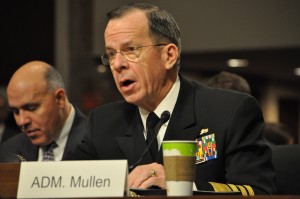National
Defense leaders support open service
Top Pentagon leaders announced Tuesday their support for allowing gays, lesbians and bisexuals to serve openly in the U.S. military while unveiling new plans for a working group that will examine the impact of such a change in the armed forces.
Defense Secretary Robert Gates and Chairman of the Joint Chiefs of Staff Adm. Michael Mullen made the remarks in the first Senate hearing in 17 years dedicated to the issue of gays in the military.
Mullen told the Senate Armed Services Committee that he favors allowing gays to serve openly as a matter of fairness for those who are serving in the armed forces.
“Speaking for myself, and myself only, it is my personal belief that allowing gays and lesbians to serve openly is the right thing to do,” Mullen said. “No matter how I look at this issue, I cannot escape … the fact that we have in place a policy that forces young men and women to lie about who they are in order to defend their fellow citizens.”
Gates similarly expressed support for ending “Don’t Ask, Don’t Tell,” noting President Obama’s last week restated his commitment to repealing the law in his State of the Union address.
“I fully support the president’s decision,” he said. “The question before us is not whether the military decides to makes this change, but how we best prepare for it. We have received our orders from the commander-in-chief and we are moving out accordingly.”
Mullen and Gates’ support for allowing gays to serve in the U.S. military stands in stark contrast to how military leaders in 1993 opposed open service and favored “Don’t Ask, Don’t Tell.”
The Senate panel received Mullen and Gates’ endorsement of allowing gays to serve openly in the U.S. military with mixed reactions — with those opposing “Don’t Ask, Don’t Tell” applauding them and those supporting the policy expressing their discontent.
Sen. John McCain (R-Ariz.), ranking Republican on the committee and strong proponent of “Don’t Ask, Don’t Tell,” said he was “deeply disappointed” with Gates’ testimony and said it showed his bias on the issue.
“It would be far more appropriate, I say with great respect, to determine whether repeal of this law is appropriate and what the effects it would have on the readiness and the effectiveness of the military before deciding on whether we should repeal the law or not,” he said.
Sen. Jeff Sessions (R-Ala.) noted Mullen only came out in favor of allowing open service after Obama announced his intent to repeal “Don’t Ask, Don’t Tell,” suggesting Mullen was taking that position to fall in line with his superior.
Sessions said Mullen’s position would interfere with his subordinates’ ability to evaluate “Don’t Ask, Don’t Tell” and the implication of its repeal.
“I guess, if it was a trial, we would perhaps raise the undue command influence defense flag,” Sessions said.
But Senate Armed Services Committee Chairman Carl Levin (D-Mich.) came to the defense of Mullen, saying the admiral was showing leadership and acting as required by a Senate-confirmed nominee by expressing his personal opinion.
“It was clear to me and, I think, clear to most of us that you think this is a view that you hold in your conscience and not given to us because you were directed to by anybody, including the commander-in-chief,” Levin said.
Gates and Mullen expressed support for a change in policy while at the same time highlighting the importance of a new Pentagon working group that would examine the issue.
Mullen said he didn’t know fully what impact ending “Don’t Ask, Don’t Tell” would have throughout the armed forces — especially in a time of two wars — and said further investigation would bring to light those implications.
“That there will be legal, social and perhaps even infrastructure changes to be made certainly seems plausible,” Mullen said. “We would all like to have a better handle on these types of concerns.”
Gates unveiled new plans for a working group that he said would examine the implications of ending “Don’t Ask, Don’t Tell.” By the end of this year, the group is charged with producing recommendations in the form of an implementation plan in the event Congress decides to repeal the statute.
Defense Department General Counsel Jeh Jonson and Gen. Carter Ham, commander of U.S. Army Europe, have been chosen to lead this working group, Gates said.
The working group, Gates said, would be charged with reaching out to the force to understand their views about repeal, examining changes in regulations and policy that need to be made and looking at the potential impact of a change in law on military readiness.
To supplement the efforts of this working group, Gates said the Pentagon will ask the RAND Corp. to update its 1993 study on the impact of allowing gays to serve in the military, which at the time found that open service wouldn’t be detrimental to the U.S. military.
In addition to the working group, Gates said he’s directed the Pentagon to review the regulations used to implement “Don’t Ask, Don’t Tell” and, within 45 days, present recommendations that could be applied under existing law to “enforce this policy in a more humane and fair manner.”
“You may recall that I asked the Department’s general counsel to conduct a preliminary review of this matter last year,” Gates said. “Based on that preliminary review, we believe that we have a degree of latitude within the existing law to change our internal procedures in a manner that is more appropriate and fair to our men and women in uniform.”
While the recommendations aren’t yet complete, Gates said the Pentagon is considering a number of options that could allow for greater latitude on discharging gay service members under current law.
Gates said it’s possible to change implementation of current law by raising the rank of officers who are authorized to either initiate or conduct inquiries under “Don’t Ask, Don’t Tell.” He also said officials can “raise the bar” on what is considered credible information or who is considered a credible source to start an inquiry on a service member.
“Overall, we can reduce the instances in which the service member who is trying to serve the country honorably is outed by a third-person with the motive to harm the service member,” Gates said.
Many LGBT activists praised Gates and Mullen for coming out in favor of allowing gays to serve openly in the U.S. military and working to adjust the rules for discharges. Still, activists maintain that full repeal is still necessary.
Lt. Dan Choi, a gay U.S. Army infantry soldier who’s facing discharge after publicly coming out last year, told DC Agenda after the hearing that “there will be some impact” by the interim changes proposed by Gates, but said it’s “missing the point.”
“When you still have people that are lying about who they are, you haven’t solved the root of the problem,” Choi said. “‘Don’t Ask, Don’t Tell’ is the establishment of a closeted policy, and I don’t think that anybody has to be closeted in our military.”
Lawmakers considering ‘Don’t Ask’ moratorium
Gates’ announcement on the formation of a new working group raises questions about whether Congress will act this year to repeal the law or instead wait until the working group completes its review.
Levin suggested he may include language that would change “Don’t Ask, Don’t Tell” in the upcoming defense authorization bill.
After Sen. Joseph Lieberman (I-Conn.) made a comment that senators need to find 60 votes to pass repeal legislation, Levin replied, “Unless there’s a provision in the defense authorization bill that goes to the floor, which would then require an amendment to strike it from the bill, in which case, the 60-vote rule would be turning the other way.”
Following the hearing, Levin told reporters that it’s possible to include in the defense authorization bill a moratorium on “Don’t Ask, Don’t Tell” that would be in place until the Pentagon completes its study.
“If we throw a moratorium on it, then what I consider to be a slow pace then would be more practical,” he said.
Asked whether he’s ruled out actual repeal in the defense authorization bill in favor of a moratorium, Levin replied, “I haven’t ruled anything out.”
Also foreseeing the possibility of repeal this year is Sen. Kirsten Gillibrand (D-N.Y.), one of the most vocal proponents in Congress of overturning “Don’t Ask, Don’t Tell.”
After the hearing, she told reporters she doesn’t think the time Gates is asking for review “will affect legislative progress” and that “we can actually write the bill and pass the bill now.”
“I think all that Adm. Mullen and Secretary Gates were saying is that they want to have a sensitivity to the impact it will have on the military and their families, and to have input in order to decide how to best to implement a policy change,” she said. “So, if they need to take time to do that, that’s fine and appropriate, but it doesn’t mean we can’t pass the repeal now, which is important to move forward on this.”
Gillibrand said she would support the inclusion of a moratorium in the defense authorization bill this year in addition to efforts for outright repeal. She said she thinks there are 60 votes in the Senate for full repeal and recalled how she considered a moratorium amendment last year on “Don’t Ask, Don’t Tell” that she ultimately didn’t introduce.
“When I did my bill on moratorium [and] I counted the votes, the only undecided Democrats at that time said their reasons were they wanted to see leadership in the military, or wanted to see leadership from the president,” she said. “And I think what this hearing brings us is leadership on both.”
But Christopher Neff, deputy executive director of the Palm Center, a think-tank on gays in the military at the University of California, Santa Barbara, was pessimistic about the chances of passing legislation to address “Don’t Ask, Don’t Tell” this year.
He said the Pentagon’s establishment of a working group would make Congress reluctant to take action until the results of its study are known.
“I think that it would be anticipated that many legislators will be waiting to hear what comes out of the study group’s report at the end of the year,” Neff said. “I think that there are enough questions that are being raised that, I think, would be difficult without this study report.”
Whatever effort Congress takes in moving toward repeal this year, lawmakers are set to hear more testimony on “Don’t Ask, Don’t Tell” in later hearings.
Levin told reporters the Senate Armed Services Committee would revisit the issue of gays in the military Feb. 11 and will hear from an “outside panel” of expert witnesses.
He also said he expects senators to ask questions on “Don’t Ask, Don’t Tell” when the service chiefs and service secretaries testify before Congress this month on the president’s budget request.
On the House said, Rep. Susan Davis (D-Calif.), chair of the House Armed Services personnel subcommittee, has scheduled a hearing on “Don’t Ask, Don’t Tell” in March that will follow up on previous testimony the subcommittee heard in 2008.
Pennsylvania
Malcolm Kenyatta could become the first LGBTQ statewide elected official in Pa.
State lawmaker a prominent Biden-Harris 2024 reelection campaign surrogate

Following his win in the Democratic primary contest on Wednesday, Pennsylvania state Rep. Malcolm Kenyatta, who is running for auditor general, is positioned to potentially become the first openly LGBTQ elected official serving the commonwealth.
In a statement celebrating his victory, LGBTQ+ Victory Fund President Annise Parker said, “Pennsylvanians trust Malcolm Kenyatta to be their watchdog as auditor general because that’s exactly what he’s been as a legislator.”
“LGBTQ+ Victory Fund is all in for Malcolm, because we know he has the experience to win this race and carry on his fight for students, seniors and workers as Pennsylvania’s auditor general,” she said.
Parker added, “LGBTQ+ Americans are severely underrepresented in public office and the numbers are even worse for Black LGBTQ+ representation. I look forward to doing everything I can to mobilize LGBTQ+ Pennsylvanians and our allies to get out and vote for Malcolm this November so we can make history.”
In April 2023, Kenyatta was appointed by the White House to serve as director of the Presidential Advisory Commission on Advancing Educational Equity, Excellence and Economic Opportunity for Black Americans.
He has been an active surrogate in the Biden-Harris 2024 reelection campaign.
The White House
White House debuts action plan targeting pollutants in drinking water
Same-sex couples face higher risk from environmental hazards

Headlining an Earth Day event in Northern Virginia’s Prince William Forest on Monday, President Joe Biden announced the disbursement of $7 billion in new grants for solar projects and warned of his Republican opponent’s plans to roll back the progress his administration has made toward addressing the harms of climate change.
The administration has led more than 500 programs geared toward communities most impacted by health and safety hazards like pollution and extreme weather events.
In a statement to the Washington Blade on Wednesday, Brenda Mallory, chair of the White House Council on Environmental Quality, said, “President Biden is leading the most ambitious climate, conservation, and environmental justice agenda in history — and that means working toward a future where all people can breathe clean air, drink clean water, and live in a healthy community.”
“This Earth Week, the Biden-Harris Administration announced $7 billion in solar energy projects for over 900,000 households in disadvantaged communities while creating hundreds of thousands of clean energy jobs, which are being made more accessible by the American Climate Corps,” she said. “President Biden is delivering on his promise to help protect all communities from the impacts of climate change — including the LGBTQI+ community — and that we leave no community behind as we build an equitable and inclusive clean energy economy for all.”
Recent milestones in the administration’s climate policies include the U.S. Environmental Protection Agency’s issuance on April 10 of legally enforceable standard for detecting and treating drinking water contaminated with polyfluoroalkyl substances.
“This rule sets health safeguards and will require public water systems to monitor and reduce the levels of PFAS in our nation’s drinking water, and notify the public of any exceedances of those levels,” according to a White House fact sheet. “The rule sets drinking water limits for five individual PFAS, including the most frequently found PFOA and PFOS.”
The move is expected to protect 100 million Americans from exposure to the “forever chemicals,” which have been linked to severe health problems including cancers, liver and heart damage, and developmental impacts in children.
An interactive dashboard from the United States Geological Survey shows the concentrations of polyfluoroalkyl substances in tapwater are highest in urban areas with dense populations, including cities like New York and Los Angeles.
During Biden’s tenure, the federal government has launched more than 500 programs that are geared toward investing in the communities most impacted by climate change, whether the harms may arise from chemical pollutants, extreme weather events, or other causes.
New research by the Williams Institute at the UCLA School of Law found that because LGBTQ Americans are likelier to live in coastal areas and densely populated cities, households with same-sex couples are likelier to experience the adverse effects of climate change.
The report notes that previous research, including a study that used “national Census data on same-sex households by census tract combined with data on hazardous air pollutants (HAPs) from the National Air Toxics Assessment” to model “the relationship between same-sex households and risk of cancer and respiratory illness” found “that higher prevalence of same-sex households is associated with higher risks for these diseases.”
“Climate change action plans at federal, state, and local levels, including disaster preparedness, response, and recovery plans, must be inclusive and address the specific needs and vulnerabilities facing LGBT people,” the Williams Institute wrote.
With respect to polyfluoroalkyl substances, the EPA’s adoption of new standards follows other federal actions undertaken during the Biden-Harris administration to protect firefighters and healthcare workers, test for and clean up pollution, and phase out or reduce use of the chemicals in fire suppressants, food packaging, and federal procurement.
Maine
Maine governor signs transgender, abortion sanctuary bill into law
Bomb threats made against lawmakers before measure’s passage

BY ERIN REED | On Tuesday, Maine Gov. Janet Mills signed LD 227, a sanctuary bill that protects transgender and abortion providers and patients from out-of-state prosecution, into law.
With this action, Maine becomes the 16th state to explicitly protect trans and abortion care in state law from prosecution. This follows several bomb threats targeting state legislators after social media attacks from far-right anti-trans influencers such as Riley Gaines and Chaya Raichik of Libs of TikTok.
An earlier version of the bill failed in committee after similar attacks in January. Undeterred, Democrats reconvened and added additional protections to the bill before it was passed into law.
The law is extensive. It asserts that gender-affirming care and reproductive health care are “legal rights” in Maine. It states that criminal and civil actions against providers and patients are not enforceable if the provision or access to that care occurred within Maine’s borders, asserting jurisdiction over those matters.
It bars cooperation with out-of-state subpoenas and arrest warrants for gender-affirming care and abortion that happen within the state. It even protects doctors who provide gender-affirming care and abortion from certain adverse actions by medical boards, malpractice insurance, and other regulating entities, shielding those providers from attempts to economically harm them through out-of-state legislation designed to dissuade them from providing care.
You can see the findings section of the bill here:
The bill also explicitly enshrines the World Professional Association of Transgender Health’s Standards of Care, which have been the target of right-wing disinformation campaigns, into state law for the coverage of trans healthcare:
The bill is said to be necessary due to attempts to prosecute doctors and seek information from patients across state lines. In recent months, attorneys general in other states have attempted to obtain health care data on trans patients who traveled to obtain care. According to the U.S. Senate Finance Committee, attorneys general in Tennessee, Indiana, Missouri, and Texas attempted to obtain detailed medical records “to terrorize transgender teens in their states … opening the door to criminalizing women’s private reproductive health care choices.”
The most blatant of these attempts was from the attorney general of Texas, who, according to the Senate Finance Committee, “sent demands to at least two non-Texas entities.” One of these entities was Seattle Children’s Hospital, which received a letter threatening administrators with arrest unless they sent data on Texas patients traveling to Seattle to obtain gender-affirming care.
Seattle Children’s Hospital settled that case out of court this week, agreeing to withdraw its Texas business registration in return for Texas dropping its investigation. This likely will have no impact on Seattle Children’s Hospital, which has stated it did not treat any youth via telemedicine or in person in Texas; the hospital will be able to continue treating Texas youth who travel outside of Texas to obtain their care. That settlement was likely compelling due to a nearly identical law in Washington that barred out-of-state investigations on trans care obtained solely in the state of Washington.
The bill has faced a rocky road to passage. A similar bill was debated in January, but after coming under intense attack from anti-trans activists who misleadingly called it a “transgender trafficking bill,” the bill was voluntarily withdrawn by its sponsor.
When LD 227 was introduced, it faced even more attacks from Gaines and Libs of TikTok. These attacks were followed by bomb threats that forced the evacuation of the legislature, promising “death to pedophiles” and stating that a bomb would detonate within a few hours in the capitol building.
Despite these threats, legislators strengthened both the abortion and gender-affirming care provisions and pressed forward, passing the bill into law. Provisions found in the new bill include protecting people who “aid and assist” gender-affirming care and abortion, protections against court orders from other states for care obtained in Maine, and even protections against adverse actions by health insurance and malpractice insurance providers, which have been recent targets of out-of-state legislation aimed at financially discouraging doctors from providing gender-affirming care and abortion care even in states where it is legal.
See a few of the extensive health insurance and malpractice provisions here:
Speaking about the bill, Gia Drew, executive director of Equality Maine, said in a statement, “We are thrilled to see LD 227, the shield bill, be signed into law by Gov. Mills. Thanks to our pro equality and pro reproductive choice elected officials who refused to back down in the face of disinformation. This bill couldn’t come into effect at a better time, as more than 40 percent of states across the country have either banned or attempted to block access to reproductive care, which includes abortions, as well as transgender healthcare for minors. Thanks to our coalition partners who worked tirelessly to phone bank, lobby, and get this bill over the finish line to protect community health.”
Destie Hohman Sprague of the Maine Women’s Lobby celebrated the passage of the bill despite threats of violence, saying in a statement, “A gender-just Maine ensures that all Mainers have access to quality health care that supports their mental and physical wellbeing and bodily autonomy, including comprehensive reproductive and gender-affirming care. We celebrate the passage of LD 227, which helps us meet that goal. Still, the patterns of violence and disinformation ahead of the vote reflected the growing connections between misogyny, extremism, and anti-democratic threats and actions. We must continue to advocate for policies that protect bodily autonomy, and push back against extremist rhetoric that threatens our states’ rights and our citizens’ freedoms.”
The decision to pass the legislation comes as the Biden administration released updated HIPAA protections that protect “reproductive health care” from out-of-state prosecutions and investigations.
Although the definition of “reproductive health care” is broad in the new HIPAA regulations, it is uncertain whether they will include gender-affirming care. For at least 16 states, though, gender-affirming care is now explicitly protected by state law and shielded from out-of-state legislation, providing trans people and those seeking abortions with protections as the fight increasingly crosses state lines.
****************************************************************************

Erin Reed is a transgender woman (she/her pronouns) and researcher who tracks anti-LGBTQ+ legislation around the world and helps people become better advocates for their queer family, friends, colleagues, and community. Reed also is a social media consultant and public speaker.
******************************************************************************************
The preceding article was first published at Erin In The Morning and is republished with permission.
-

 State Department2 days ago
State Department2 days agoState Department releases annual human rights report
-

 Maryland4 days ago
Maryland4 days agoJoe Vogel campaign holds ‘Big Gay Canvass Kickoff’
-

 Politics3 days ago
Politics3 days agoSmithsonian staff concerned about future of LGBTQ programming amid GOP scrutiny
-

 The White House1 day ago
The White House1 day agoWhite House debuts action plan targeting pollutants in drinking water
















